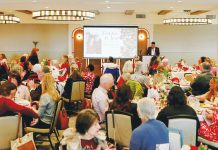“Escrow” is one of those words you hear tossed around. People “open escrow” and “close escrow,” and — as was the case recently with Bethany University — some deals “fall out of escrow.”
But what is escrow?
The word comes from the old French word “escroue,” which means scroll but implies a checklist.
It is an arrangement in which two parties to a transaction hire a disinterested third party to check off items on a checklist.
“It’s a gathering together of all the necessary documents and funds,” said Jack Western, a Realtor in Scotts Valley, “The purpose of escrow is to make sure everything is on the up and up, the inspections are done, the cash is there, the title is searched, and that there’s no hanky panky.”
For example, let’s say a seller finds a buyer for his house. The two parties sign a sales contract. The buyer makes a good-faith deposit toward purchase of the house. The contract and deposit are given to an escrow company until all details of the sale are ironed out.
If all goes smoothly, the buyer gets a loan from a bank, the bank sends the money to the escrow company, the escrow officer disburses the money to the seller, the buyer gets title to the house, and escrow closes. The deal is done.
But there are many complications that can arise. These days, banks are careful about lending and many deals fail to get financing. A buyer might think he can get a loan, but if the bank balks, the sale falls through.
What went wrong in the Bethany deal hasn’t been made public. The 72-acre campus was put up for sale in June. Another Christian university, Olivet, agreed to buy it in August, and a deadline for closing escrow was set. That deadline was postponed four times. Then, last month, Bethany announced the deal was dead.
“When you see escrows and closing dates pushed back further and further, it’s not unusual to have a funding issue with the buyer,” said Chuck Maffia, vice president of Santa Cruz County Bank in Scotts Valley.
Part of the problem was that, according to Olivet officials, the college tried to package financing of the Bethany campus with a deal for the nearby Borland property, a 488,000-square-foot facility on the other side of Highway 17. Olivet planned to use both properties as its campus.
Olivet had agreed in principle to pay the debt owed on the Bethany campus, estimated at $15 million. That, combined with the Borland purchase, might have been too much.
“That’s a difficult financing package,” said David Bergman, a Scotts Valley Realtor. “How do you get enough cash flow to make the payments?”
The failure of the deal to close won’t have much impact on the local real estate market, Bergman said. Students rarely buy homes; they rent. And rental properties in Scotts Valley are already in such high demand that there are waiting lists, he said.
Olivet, like Bethany, is a nonprofit, so the city would not get property tax revenue if Olivet moved in. The loss to the city is to restaurants, stores and other nearby businesses that students frequent.
Bergman doesn’t expect the campus to remain vacant.
“From what I hear, there’s a lot of interest in Bethany,” he said. “It’s a desirable piece of property.”
– Mark Rosenberg is an investment consultant for Financial West Group in Scotts Valley, a member of FINRA and SIPC. He can be reached at 439-9910 or mr********@*wg.com.












